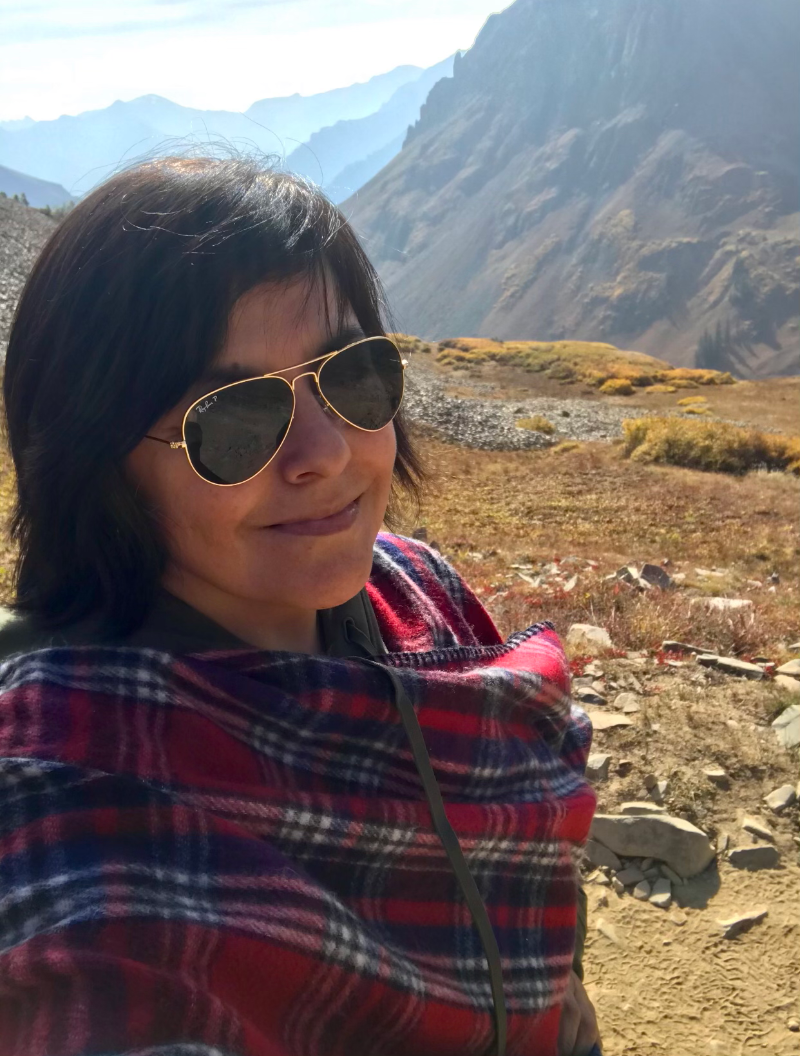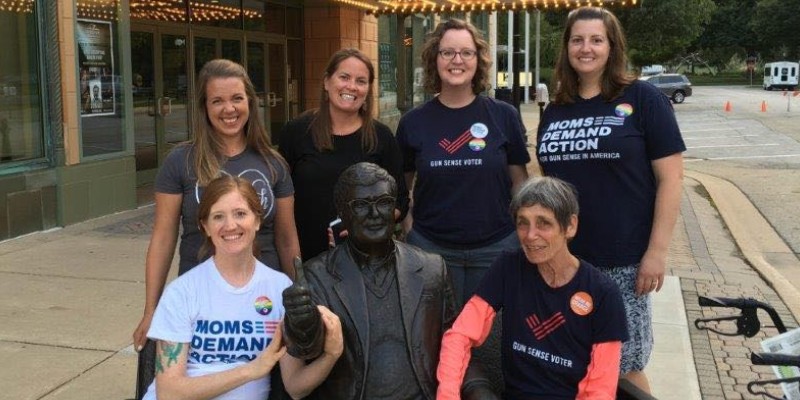March is Women’s History Month, and the link between women making history and women shaping culture is indelible. Women have been the guardians of culture all across the world and throughout history. We have taught children and each other about the cultures we are all immersed in. Because of women, we know who we are as a people and as a community. Because of women, our communities have grown, healed, evolved, and flourished.
I spoke to two women who chose our community as home, and I learned how these women have been shaped by the women in their own lives. Jenny Putman and Lucia Maldonado have shaped our community’s culture and people, history and future trajectory, for the better.
Putman (seated to the right of the Roger Ebert statue, above) arrived in C-U in 1973, having grown up in Honolulu, Hawai’i. “And not the ‘touristy’ part,” Putman explains. “I’m from where people in Hawai’i actually live, where they go to work every day, get the mail and take out the trash.”
“I grew up in the 1960s, in an era very similar to today’s,” Putman recalls. It was a time when demonstrations in the streets often got violent. “It was militant, brutal,” Putman recollects. Personal relationships were battered and torn apart from political disagreements, just like they are today, and fissures in family bonds grew at the dinner table as family members argued for or against the Vietnam War, for or against civil rights, for or against nuclear disarmament.
Putman’s political activism began in Hawai’i, where she organized with other anti-war protestors. Hawai’i’s strategic location in the Pacific meant that Putman’s community was visited by many U.S. military personnel who came to Honolulu for some rest and recuperation (R&R). “There was an active sanctuary movement for soldiers who were convinced to not return to base after their R&R,” Putman explains. Convincing military personnel to not return to base was absolutely illegal and risky, but because policy, politics and activism have always dominated how Putman sees life, these acts of protest are how she was able to influence the anti-war effort in her community.
Because it is so expensive to live on Hawai’i, Putman explains that about half of her class went on to relocate to the mainland. Putman began her college education at the University of Hawai’i, where her parents were faculty members, but she finished her bachelor’s degree here at the University of Illinois. Putman then reclaimed her role in activism, governance, and policy, but this time to the benefit of Champaign County.
Another woman who chose to call C-U home is Lucia Maldonado. “I work for Urbana School District. I’m proud of what I do.” She’s a parent liaison whose work is very well-known: She works with unaccompanied minors from Guatemala, who made the very dangerous journey without their parents to live and work here in C-U.

Photo by Lucia Maldanado.
Maldonado is instrumental in assisting these young people who’ve recently arrived in our community. They are often sent to the U.S. by themselves or with smugglers, a parental decision that Maldonado explains she can’t understand but she’s made peace with. She helps these students get registered for school and connects them with essential resources, like backpacks filled with school essentials, food from the pantry at school, and clothes from community members who want to help these kids who are building a new life here.
Maldonado connects with these kids because when she arrived from Mexico 26 years ago, she felt so stressed from adapting to culture and life here. When her kids were little, she was busy trying to learn English herself while maintaining a Spanish-language home so that her children could be bilingual and bicultural. “It was so difficult for me to maintain a balance.”
This parent liaison is often a cultural guide for young people arriving from Guatemala. “People at school say these unaccompanied minors are ‘Lucia’s kids.’” And it’s true. Maldonado acknowledges she’s the one who yells at these kids when they break safety rules, when they don’t go to school, when they ride their bikes on the sidewalk in Campustown, or when they drive to their jobs without a license. Her tough love is meant to keep these kids safe. While their very dangerous journey crossing the border is behind them, living as an independent teenager in a new country can be risky. But in addition to being a remote guardian of sorts, Maldonado also teaches these unaccompanied minors Midwestern cultural lessons that she remembers learning the hard way when she arrived here.
“I try to teach the kids how to write a thank you note. I never did that in Mexico. The kids ask, ‘Why?’ and the answer is, because it’s what people do here.”
Putman explains how her politics and activism have evolved over the decades. From the politics of radical activism of the Vietnam War and Civil Rights era, to the politics of becoming an elected official who served for many years on the Champaign County Board, Putman’s work within our community has changed to reflect our community’s dynamic reality and needs. I asked Putman about the women who brought her up within a culture of women’s activism. “My mom was politically active; she was also an attorney for the medical school at the University of Hawai’i.” Putman also points to the women who served in local government before her arrival and she humbly suggests that she’s done nothing novel. (I must respectfully disagree.) Laurel Prussing, Sherry Stillinger, and Helen Satterthwaite are all women and local elected officials who blazed a trail that Putman could follow to make her own mark on our community.
Maldonado reflects on the women who have shaped her, and how she in turn has shaped life for her daughters and the unaccompanied minors from Guatemala whom she guides through young adult life here in Urbana-Champaign. Her grandmother, who died about a year ago, was one of the greatest influences on Maldonado’s life. “My grandma was the center of our family when I was growing up. She helped me when I had my daughter at 18. She was the person I’d go to talk to. She was my rock. She’s the center for everything I became,” Maldonado recalls with emotion. “My grandma was a single mother of two, and she was able to survive in a time that women couldn’t live without a man in Mexico.” She recalls one of her final conversations with her grandma, one in which Maldonado asked difficult, personal questions in an attempt to better understand herself. Her grandma told her, “You’re not difficult. You’re gentle and generous. You are tough and strong because you have to be.” Maldonado carries this conversation with her, along with a treasured shawl of her grandmother’s, and she draws strength from them in her difficult moments as a guide to the young adults who’ve grown to trust her guidance.
How has Maldonado passed along culture to her own kids, who are now grown, and to the unaccompanied minors she serves today? “I want my kids to know they can be from both [Mexico and the U.S.] They have so much to offer to both places.” She unintentionally passed on her passion for activism to her daughters. Maldonado beamed with pride watching her younger daughter Paola participate in immigration rights marches. Paola explained that her own motivation to fight for justice came from understanding what her own mother sacrificed in order to move the family to the U.S. several decades ago. Maldonado explains that it was always the goal to give her kids a better life so that they could have more opportunities, and seeing her daughters come full circle in their cultural understanding and activism has been validating.
And to the unaccompanied minors in Maldonado’s orbit, she teaches them that they, too, belong to two places. In her role as parent liaison, Maldonado helps organize cultural festivals to ensure every student’s culture has a space to be celebrated here. She helps ensure that kids can receive culturally relevant foods from their school’s food pantry. She wants other newly-arriving folks to not experience the “less-than” feelings she often felt as someone who calls two different countries home.
Just as Maldonado is a healer and a guide within the unaccompanied minor community, Putman has been a healer and a guide within our political and activist communities. In hearing Putman describe the cultural rifts and family divisions of the 1960’s, I wondered what she could teach us about healing the rifts and divisions of our time. I asked Putman if she believes women play a role in healing the wounds of the past few years. Putman thinks it’s more complicated than that. “Women don’t have a role distinct from men,” she says. She recalls how, as a Democrat serving on a super-majority Republican County Board, elected officials from different sides of the aisle could go out for drinks after board meetings. “People get their news from different sources and we don’t all hear the same things,” Putman details. “We are at a place where we don’t even want to talk to each other.”
These days, Putman dedicates her time and activism to the gun violence epidemic that is destroying lives in C-U. She’s been a very active member of the local chapter of Moms Demand Action, regularly participating in meetings, keeping members up-to-date on opportunities, and visiting elected representatives to the Illinois General Assembly to advocate for better, safer policies that can decrease gun violence.
Happy Women’s History Month to all of our C-U residents, and a sincere thank you to every woman who’s made our community better. May we continue to build on the foundation that their sacrifices established for us.








